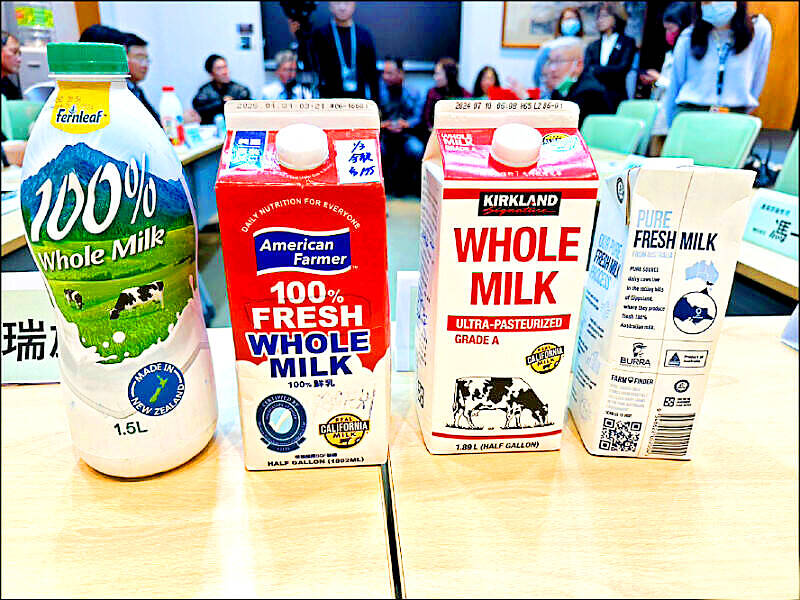The government is to revise regulations to require all imported milk to be labeled “milk” (牛乳) to separate it from domestically produced “fresh milk” (鮮乳), said the Cabinet’s Food Safety Office yesterday.
The plan has won the support of the local dairy industry, along with the ministries of agriculture, economic affairs, and health and welfare during an inter-agency meeting yesterday, and the new regulations are expected to be implemented in July next year, it said.
The health ministry in June last year published revised regulations stipulating that milk with a shelf life of 30 days or more should be called “extended shelf-life fresh milk,” sparking an outcry among local dairy farmers, as the nation was preparing to allow tariff-free imports of liquid milk products from New Zealand starting this year.

Photo: Taipei Times
While the Cabinet last month instructed the Food and Drug Administration to limit use of the label “fresh milk” to products with a shelf life not longer than 14 days, US and Japanese authorities expressed concern that such a non-scientifically based requirement might contravene WTO regulations.
The government is thus planning to stop using shelf life to distinguish between “fresh milk” and “non-fresh milk,” the health ministry said.
Imported milk would simply be labeled as “milk,” it said.
The “fresh milk” label, as well as the Traceable Agricultural Product and the Certified Agricultural Standard (CAS) labels, would continue to apply to locally produced fresh milk, including milk from sheep and cows, to differentiate it from imported milk, it added.
Dairy Farmer Association chairman Lee Hsun-tan (李恂潭), citing a government briefing earlier yesterday, said that only milk products that have obtained “domestic fresh milk” labels and CAS certification can be named “fresh milk,” while milk products made from milk ice cubes should be labeled “reconstituted milk.”
To allow time to preview the legal revisions and companies to redesign product packagings, the new regulations are expected to take effect in the second half of next year at the earliest, he said.
While the government’s proposal is not yet final as it said further discussions are needed, dairy farmers have expressed their support for the explicit distinction between domestic and imported milk, he said.
Dairy Association of Taiwan secretary-general Fang Ching-chuan (方清泉) said the proposed measures align with international standards stipulated by the Codex Alimentarius Commission.
The term “fresh milk” would also be banned from use in food products that are not made from fresh milk, he said.
Products named “fresh milk pudding” or “fresh milk cake” should have used fresh milk as an ingredient, otherwise it would be mislabeling, Fang added.

WAITING GAME: The US has so far only offered a ‘best rate tariff,’ which officials assume is about 15 percent, the same as Japan, a person familiar with the matter said Taiwan and the US have completed “technical consultations” regarding tariffs and a finalized rate is expected to be released soon, Executive Yuan spokeswoman Michelle Lee (李慧芝) told a news conference yesterday, as a 90-day pause on US President Donald Trump’s “reciprocal” tariffs is set to expire today. The two countries have reached a “certain degree of consensus” on issues such as tariffs, nontariff trade barriers, trade facilitation, supply chain resilience and economic security, Lee said. They also discussed opportunities for cooperation, investment and procurement, she said. A joint statement is still being negotiated and would be released once the US government has made

Authorities have detained three former Taiwan Semiconductor Manufacturing Co (TMSC, 台積電) employees on suspicion of compromising classified technology used in making 2-nanometer chips, the Taiwan High Prosecutors’ Office said yesterday. Prosecutors are holding a former TSMC engineer surnamed Chen (陳) and two recently sacked TSMC engineers, including one person surnamed Wu (吳) in detention with restricted communication, following an investigation launched on July 25, a statement said. The announcement came a day after Nikkei Asia reported on the technology theft in an exclusive story, saying TSMC had fired two workers for contravening data rules on advanced chipmaking technology. Two-nanometer wafers are the most

NEW GEAR: On top of the new Tien Kung IV air defense missiles, the military is expected to place orders for a new combat vehicle next year for delivery in 2028 Mass production of Tien Kung IV (Sky Bow IV) missiles is expected to start next year, with plans to order 122 pods, the Ministry of National Defense’s (MND) latest list of regulated military material showed. The document said that the armed forces would obtain 46 pods of the air defense missiles next year and 76 pods the year after that. The Tien Kung IV is designed to intercept cruise missiles and ballistic missiles to an altitude of 70km, compared with the 60km maximum altitude achieved by the Missile Segment Enhancement variant of PAC-3 systems. A defense source said yesterday that the number of

Taiwanese exports to the US are to be subject to a 20 percent tariff starting on Thursday next week, according to an executive order signed by US President Donald Trump yesterday. The 20 percent levy was the same as the tariffs imposed on Vietnam, Sri Lanka and Bangladesh by Trump. It was higher than the tariffs imposed on Japan, South Korea and the EU (15 percent), as well as those on the Philippines (19 percent). A Taiwan official with knowledge of the matter said it is a "phased" tariff rate, and negotiations would continue. "Once negotiations conclude, Taiwan will obtain a better